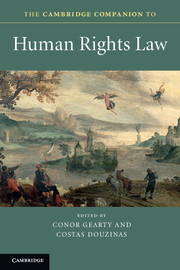Book contents
- Frontmatter
- Contents
- Preface
- Notes on contributors
- Acronyms and abbreviations
- Introduction
- Part I All kinds of everyone
- Part II Interconnections
- 4 Foundations beyond law
- 5 The interdisciplinarity of human rights
- 6 Atrocity, law, humanity: punishing human rights violators
- 7 Violence in the name of human rights
- 8 Reinventing human rights in an era of hyper-globalisation: a few wayside remarks
- Part III Platforms
- Part IV Pressures
- Index
- References
7 - Violence in the name of human rights
from Part II - Interconnections
Published online by Cambridge University Press: 05 December 2012
- Frontmatter
- Contents
- Preface
- Notes on contributors
- Acronyms and abbreviations
- Introduction
- Part I All kinds of everyone
- Part II Interconnections
- 4 Foundations beyond law
- 5 The interdisciplinarity of human rights
- 6 Atrocity, law, humanity: punishing human rights violators
- 7 Violence in the name of human rights
- 8 Reinventing human rights in an era of hyper-globalisation: a few wayside remarks
- Part III Platforms
- Part IV Pressures
- Index
- References
Summary
Three months after NATO concluded its seventy-eight-day campaign over Kosovo, Secretary-General Kofi Annan presented his annual report for 1999 to the UN General Assembly. In it, he presented in stark terms the dilemma confronting those who privileged international law over the need to respond to gross and systematic violations of human rights:
To those for whom the greatest threat to the future of international order is the use of force in the absence of a Security Council mandate, one might ask – not in the context of Kosovo – but in the context of Rwanda: If, in those dark days and hours leading up to the genocide, a coalition of States had been prepared to act in defense of the Tutsi population, but did not receive prompt Council authorization, should such a coalition have stood aside and allowed the horror to unfold?
The hypothetical presented here neatly captured the ethical dilemma as many of the acting states sought to present it. Could international law truly prevent such ‘humanitarian’ intervention?
The problem, however, is that this was not the dilemma faced in the context of Rwanda. Rather than international law restraining a state from acting in defence of the Tutsi population, the problem in 1994 was that no state wanted to intervene at all. When France, hardly a disinterested actor, decided to intervene, its decision was swiftly approved in a Council resolution (though reference to ‘impartiality’, a two-month time-limit and five abstentions suggested wariness about France’s motivation).
- Type
- Chapter
- Information
- The Cambridge Companion to Human Rights Law , pp. 134 - 149Publisher: Cambridge University PressPrint publication year: 2012
References
- 1
- Cited by



